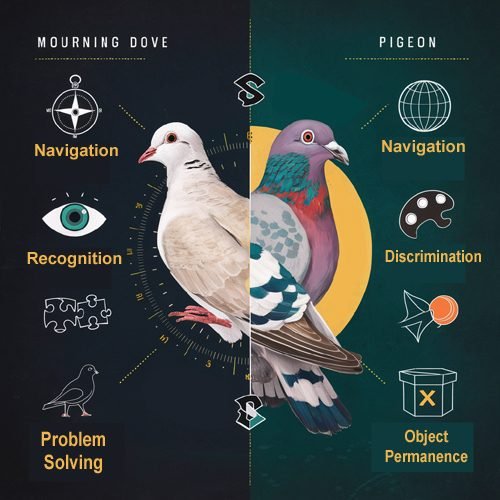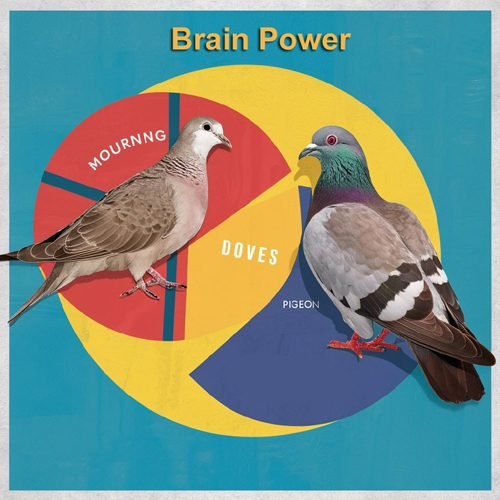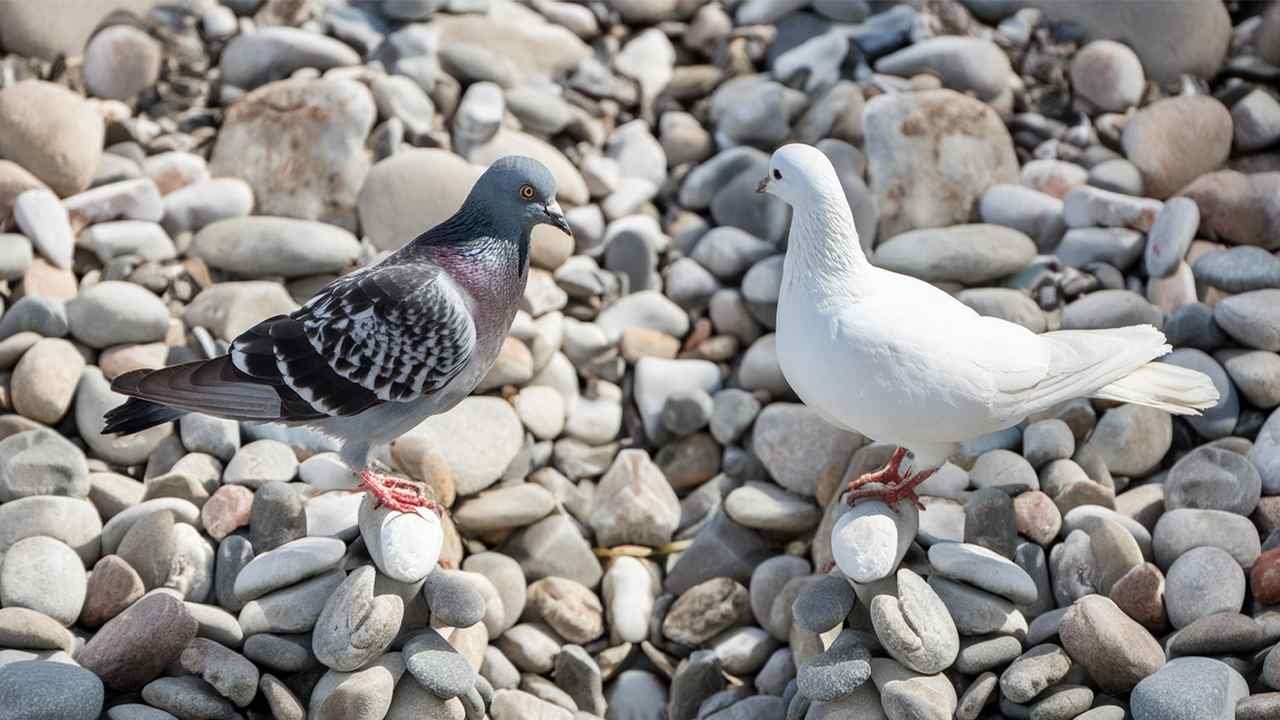Ever seen a mourning dove zip around your garden or a pigeon cruising the busy city streets? These regular birds, members of the Columbidae family, may seem different. Pigeons are often seen as clever, while mourning doves are symbols of calm and peace, but not always considered smart. But if you look deeper, you might be surprised: both mourning doves and pigeons have impressive smarts that are worth appreciating.
Unveiling the Intelligence of Mourning Doves: Beyond the Soft Coo
Mourning doves, with their melancholic calls and delicate features, might not appear to be intellectual powerhouses. But beneath their serene exterior lies a mind capable of impressive feats.
- Masters of Navigation: Every six months, mourning doves take part in amazing journeys – flying many miles to move between their mating and winter homes. Their journeys need a great spatial memory – a super special kind of map in the brain. Let’s talk anatomy. A part of the brain called the hippocampus – which helps with finding our way around just like in humans and other animals – is very important for this. In fact, it can store and understand details like markers, lengths, and paths. Due to this, mourning doves can find their way around tricky paths with great precision.
- Problem Solvers and Recognizers: Mourning doves aren’t merely savvy direction-finders; they’re equally skillful at cracking problems. These feathered friends have the knack for earmarking specific threats, which helps them dodge risky situations. They’re also pros at spotting stable food providers and have strategies to get their next meal, showing impressive creativity. For instance, let’s say there are seeds stuck in a feeder; our mourning doves will apply twigs like tools to get their dinner, proving they’re masters at twisting things to meet their needs.
- A Symphony of Communication: Mourning doves don’t just stick to their trademark sad sound. They’ve got all kinds of noises up their feathery sleeves. Some sounds are just for talking with their partner, others are fast and sharp for danger alerts.
Pigeon Power: More Than Just Street Smarts
While pigeons fluttering around city squares might seem commonplace, their cognitive abilities are far from ordinary.
- Navigational Virtuosos: The Columbidae family boasts a special breed known as homing pigeons. Their uncanny knack for finding their way home over vast distances has captured people’s fascination for hundreds of years. Such a trait was put to use in delivering messages, underscoring their extraordinary compassing abilities. Interesting theories suggest that pigeons are equipped with magnetoreception, a built-in compass, which lets them detect the Earth’s magnetic field and chart their course accordingly.
- Discerning Detectives: Did you know that pigeons are really smart? Turns out, if trained to distinguish between different artistic styles, they can recognize the difference between a Monet and Picasso painting. It gets even more incredible! Some research even hints that pigeons might spot cancer cells in x-rays with an impressively correct rate.
- Understanding the World Around Them: Pigeons understand object permanence, knowing things are still there even if they can’t see them. This helps them survive, as they recall where food is hidden. Sometimes, they have been seen using tools like sticks or tiny things to move food nearer or reach spots they can’t usually get to.

A Comparison of Mourning Dove and Pigeon Intelligence
| Feature | Mourning Dove | Pigeon |
|---|---|---|
| Navigation | Exceptional spatial memory, relies on celestial cues for long-distance migration | Excellent homing ability, possible magnetoreception |
| Problem-Solving | Recognizes predators and food sources, devises strategies to access resources | Trained to distinguish between artistic styles, potential cancer cell detection |
| Communication | Diverse vocalizations beyond the mourning call (possible nuanced meanings) | Standard cooing calls, limited research on communication complexity |
| Focus | Spatial awareness, predator recognition, adaptation for diverse habitats | Object recognition, potential for abstract learning |
Do Mourning Doves Trump Pigeons in the Intelligence Game?
Having explored the cognitive prowess of both mourning doves and pigeons, a natural question arises: which species reigns supreme in the intelligence department? The answer, however, is not a simple one.
- Shared Traits, Shared Success: Both mourning doves and pigeons show awesome memory of places, something really important for living in the wild. They can fly across giant areas and find what they need, showing us how smart they are. Plus, they’re great at solving problems, which lets them adjust to where they live and beat tough situations.
- Focus on Different Strengths: Mourning doves and pigeons, though similar, have unique brainpower areas. Doves, known for long-haul flights and outrunning predators, probably shine in tasks dealing with space knowledge and spotting things. Pigeons, however, flourishing in the bustling cityscapes, might be better at pinpointing and telling apart specific things.

Examples of Avian Intelligence Across Different Bird Species
| Bird Species | Examples of Intelligence |
| Mourning Dove | • Exceptional spatial memory for long-distance migration • Recognition of individual predators and food sources • Use of twigs to dislodge seeds from feeders |
| Pigeon | • Impressive homing navigation skills • Ability to distinguish between artistic styles (e.g., Monet vs. Picasso) • Potential for detecting cancer cells in mammograms • Understanding of object permanence |
| Crow | • Tool use (using sticks to extract grubs from logs) • Complex social structures and communication • Planning and problem-solving abilities |
| Parrot | • Mimicking human speech and complex sounds • Ability to learn and solve puzzles • High working memory capacity |
| Hummingbird | • Exceptional memory for flower locations and food sources • Ability to hover in mid-air for extended periods • Efficient foraging strategies |
| Jay | • Food caching behavior (hiding food for later retrieval) • Recognition of individual humans and predators • Adaptability to diverse environments |
| Raven | • Tool use (using sticks to access food or displace competitors) • Ability to solve complex puzzles • Long-term memory and sophisticated communication |
| Magpie | • Object recognition and spatial memory • Theft and deception (known to steal shiny objects) • Complex social behavior |
| Keel-billed Toucan | • Large beak adaptation for reaching food and fighting • Excellent spatial memory for food sources • Social communication through vocalizations |
| Owl | • Superior night vision and hearing for hunting • Rotatable head for wide range of motion • Silent flight for stealthy predation |
A Final Thought
“Doves or pigeons: which is smarter?” is a thought-provoking question. Yet, there’s no straight answer. Mourning doves and pigeons both boast amazing smarts, but in different areas. For instance, mourning doves are ace navigators and quick to spot danger, essential skills in varied environments. Pigeons, city dwellers, are champs at identifying and differentiating objects. So, bird IQ isn’t black or white, and both species illustrate their brainpower impressively.

